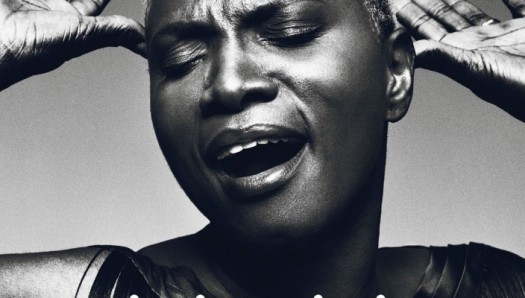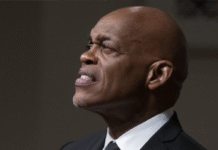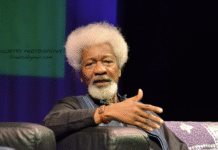
(Photo Credit: Pierre Marie Zimmerman)
Angelique Kidjo recently released her memoir, Spirit Rising, followed by her 13th album, Eve, simultaneously. Both projects are platforms for the Grammy-winning world music artist to continue her knacks for multitasking and humanitarianism.
An energetic Kidjo says via phone en route to another interview, “Writing the album and writing the book are complimentary to me. They really taught me the reasons why I do what I do. I’m used to doing two or three things at the same time like any woman in the world. That’s what we do,” she says.
Eve, like the tireless vocalist’s previous efforts, meshes elements of Afrobeat, R&B, soul, jazz, salsa, reggae, gospel, rhumba, zook and makossa. Kidjo’s vivacious vocals are sung primarily in English, Yoruba, French and Fon. When Kidjo sings, she’s accompanied by a chorus of primitive call-and-response chants or rhythmic percussive arrangements.
Eve is the celebrated vocalist’s concept album that pays homage to women and girls in Africa. Kidjo’s songwriting process took about three years to complete. She frequently visited villages throughout her homeland for inspiration. “I just do what I have to do. I have a voice to be heard. We have to do everything in our power to make things happen,” says Kidjo with her West African accent.
Kidjo’s spirited music portrays both a lively ambiance and infectious energy. She feels stifled sometimes when she’s in the recording studio making magic. The giddy singer, whose husband co-writes her material, enjoys collaborating. “Our goal is the conversation. It’s respect. I like to feel that we can all be together, do it, come together and play. The elements never collide. They form a unity,” says a giggling Kidjo.
Spirit Rising mixes personal narratives with Kidjo’s favorite recipes, still photographs, wisdom and song lyrics. The book is a hybrid of her passions: music, storytelling and preparing meals for close family and friends. Writing the book, she says wasn’t an easy process. “Writing a memoir was much more difficult that writing songs, I’ll tell ya that. All of those things define me. I really love doing those things together. It’s who I am,” says Kidjo.
Kidjo’s memoir was originally a coping strategy to mourn her father’s passing in 2008. “Everyone was seeing me struggle with my pain. They urged me to record all of those memories,” she says. As the stories developed, Kidjo made it quite clear to cowriter, Drexel University professor Rachel Wenrick, “It has to be my book. You have to tell the story the way I’m telling it to you. No one can define you unless you let them do that. I want it to be good to people. I want people to relate to it. That’s how I balance it,” says an assured Kidjo.
With Eve and Spirit Rising, Kidjo feels compelled to call attention to social problems. She has no qualms expressing concerns about social injustice, poverty, domestic violence or the effects of war on society. She believes in the power of the human race. “Everything is connected. There’s only one human family. We all love together. If we don’t take care, we will not be able to blame anybody but ourselves,” says Kidjo.
No stranger to political war and oppression, Kidjo herself even relocated from Benin to Paris in 1980. Kidjo believes being a catalyst for change starts with self. “We want change. If you want revolution, you cannot decide for other people. We all have to come together and decide what kind of society we want. Being an activist is just being conscious no matter what is going on,” says Kidjo.
Kidjo, a passionate ambassador for both UNICEF and Commission of the African Union (AU), creates solutions. Her nonprofit, Batonga Foundation, provides educational tools and relief to young African girls and mothers. Through a partnership with UNICEF and Pampers, she helped fund vaccines to eliminate tetanus in pregnant women.
The dynamic, outspoken agent of social change takes matters into her own hands. “Life is complicated and simple at the same time. It depends on what you want from it. If we don’t talk, speak up or let our leaders know what we want as people, our silence gives them the power to use anyway they want to. Don’t just put it out there and talk about stuff that you don’t even know how you’re gonna fix it,” believes Kidjo.
Another element to Kidjo’s empathetic advocacy work is encouraging people across the world to feel the vibrancy of the African continent. The NAACP Image Award winner doesn’t care for Westernized views of African people and culture being perceived as unsophisticated or savages. “If we can’t see the beauty in Africa, we can’t see the beauty in ourselves. We are all Africans. If Africa don’t do right, the world don’t do right,” says Kidjo.
With the new album, book and continuous activism work, Kidjo is both grateful and overjoyed by the power of her music makes a global impact. She’s one of Africa’s most renowned and politically conscious female performers. However, she’s not afraid to have a sense of humor. When it comes to her art, Kidjo thinks being an entertainer just comes naturally.
“The most important thing is to breathe. I’ve always been in a state of mind that anything can happen and be prepared for anything that comes. I don’t try to prepare too much. I just do what I have to do,” says Kidjo.
This post was written by Christopher A. Daniel, pop cultural critic and music editor for The Burton Wire. He is also a contributing writer for Urban Lux Magazine and Blues & Soul Magazine. Follow Christopher @Journalistorian on Twitter.
Like The Burton Wire on Facebook. Follow us on Twitter @TheBurtonWire.








